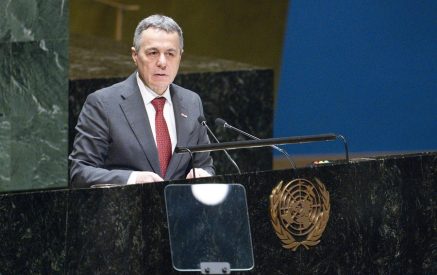Ahead of the first OSCE Supplementary Human Dimension Meeting under the Slovak OSCE Chairmanship, which will focus on tolerance and non-discrimination in Vienna, OSCE Chairperson-in-Office and Slovak Minister for Foreign and European Affairs, Miroslav Lajčák called for more dialogue, respect and closer co-operation in combating intolerance, discrimination and hate crimes.
“Our organization is built on the concept of comprehensive security. This means that dialogue, tolerance and respect for cultural diversity and human rights are not just good for humanity, but can also act as key drivers of peace. In times where political and religious intolerance is rising, I believe dialogue is key. It can foster tolerance and solidarity among diversity. It can enable us to prevent conflicts. And it can help us to achieve a culture of lasting peace.” said the Chairperson-in-Office.
The event in Vienna, organized in co-operation with the OSCE Office for Democratic Institutions and Human Rights (ODIHR), will bring together more than 150 representatives from OSCE participating States, intergovernmental organizations, educational institutions, religious or belief communities and civil society from across the OSCE’s participating States and Partners for Co-operation to discuss the progress made by participating States in implementing OSCE commitments on upholding the principles of tolerance and non-discrimination, including in the promotion and protection of freedom of religion or belief.
“The continuing reports from religious or belief communities of racism, intolerance and discrimination manifested in various forms, including hate crimes, should trouble us all. These violations of the most basic human rights, including the freedom of religion or belief, are a threat to security and stability both within countries and at the regional level,” added ODIHR Director Ingibjörg Sólrún Gísladóttir. “As a priority, we must work together to understand and dismantle the systemic root causes of these terrible phenomena.”
Read also
Noting that the principles of tolerance and non-discrimination and the right to freedom of religion or belief are inseparable and interrelated, and under severe stress in the OSCE region, Professor Ingeborg Gabriel, Personal Representative of the OSCE Chairperson-in-Office on Combating Racism, Xenophobia and Discrimination, also focusing on Intolerance and Discrimination against Christians and Members of Other Religions, pointed out that “to counter any form of intolerance – also against Christians and members of other religions – and to achieve lasting social peace, we need concerted efforts, including from civil society institutions and religious communities, to strengthen these principles and to stand up for a decent society based on mutual respect”.
Ambassador Mehmet Paçacı, Personal Representative of the OSCE Chairperson-in-Office on Combating Intolerance and Discrimination against Muslims, warned that according to official and civil society reports, cases of intolerance and discrimination against Muslims in the OSCE region are on the rise. “Despite many recent good practices, monitoring and reporting the cases of intolerance and discrimination against Muslims are still at a very low level in our region.”, he warned.
“Freedom of religion is surely predicated on the basic safety and security of its practitioners to gather in prayer and fellowship. They must also be free to engage in the religious observance and practice that shape their identity.”, stressed Rabbi Andrew Baker, Personal Representative of the OSCE Chairperson-in-Office on Combating Anti-Semitism. “Thus, we need to flag the dangers of a growing secular environment that is hostile to religion more generally,” he added.
The event in Vienna also aims at discussing how best to prevent and respond to intolerance and create an appreciation for diversity. Various lessons learned will be exchanged, with focus placed on initiatives and tools such as education policies and awareness-raising strategies. Co-operation between different communities, groups and organizations will be discussed as a key element in tackling discrimination and intolerance.
Following up on the commitments made by all 57 participating States, including from the Basel Ministerial Council in 2014, the Supplementary Human Dimension Meeting’s goal is to take stock of the implementation of commitments in the area of tolerance and non-discrimination. The event also provides a forum for identifying and discussing promising practices and challenges in this respect in the OSCE region.
Ultimately, this could be conducive towards potential Bratislava OSCE Ministerial Council decisions in the area of freedom of religion or belief. The meeting follows up on and complements the Conference on Combatting Anti-Semitism in the OSCE Region, which took place in Bratislava in February 2019.






















































